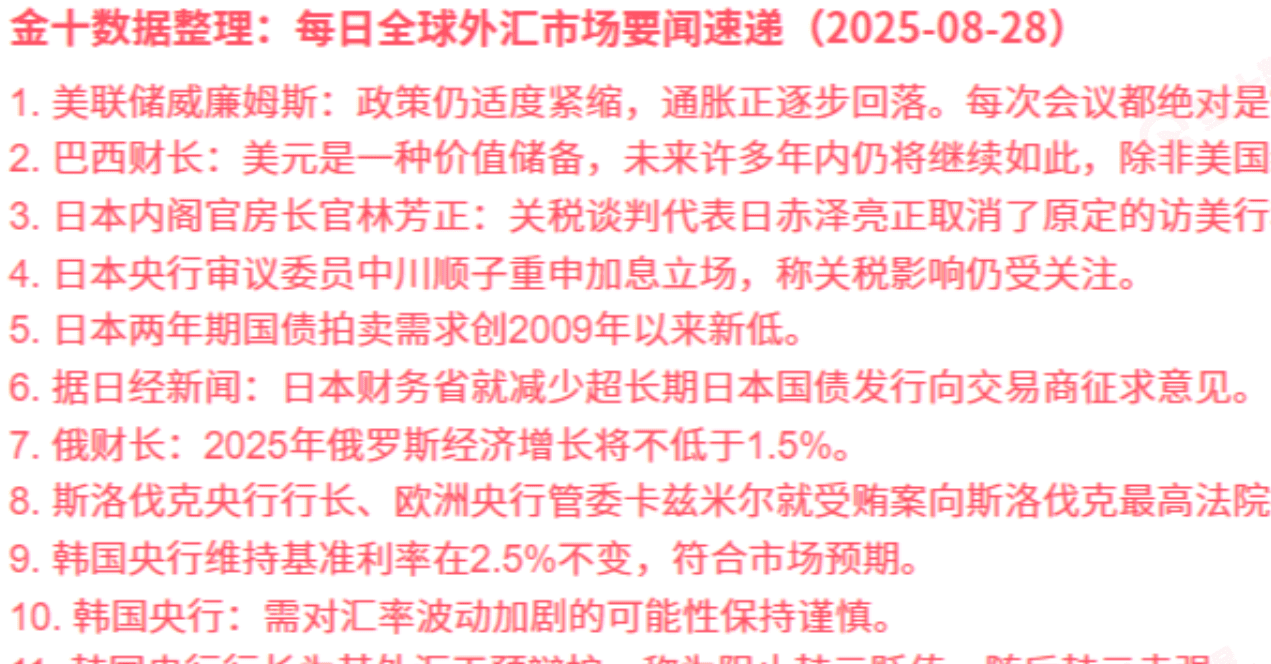Dear friends, I am the Key to the Blockchain. This morning, there have been many developments in the global foreign exchange field. As a senior analyst, I am here to provide you with a comprehensive and accurate analysis of the key points and information corrections. The overall direction of the original text is correct, but in order to make the content more in line with the real situation of the current market, some data and expressions need to be optimized and updated.
Federal Reserve-related
Federal Reserve's Williams mentioned that policies are still in a relatively tight state. However, regarding his statement that 'inflation is gradually retreating,' a more accurate description should be that 'the pace of inflation retreat is unstable and subject to certain fluctuations.' This better reflects his cautious attitude in recent statements. After all, the uncertainty of inflation trends has always been a particularly troublesome issue for the Federal Reserve in formulating policies.
Views of the Brazilian Finance Minister
The core message of the Brazilian Finance Minister's speech is not incorrect. In simple terms, it means that the dollar's hegemony is unlikely to be shaken in the short term, but the U.S. practice of 'weaponizing' the dollar is undoubtedly digging a pit for itself and will accelerate the decline of dollar hegemony. It's like someone using their own advantages to arbitrarily suppress others, ultimately only inciting public anger and losing their advantageous position.
Japan-related developments
Cancellation of tariff negotiation representative's visit to the U.S.: The news that Japan's tariff negotiation representative has canceled the visit to the U.S. is true. Moreover, the Japanese side has hinted at possible countermeasures. It's like two people at the negotiation table breaking down; one side directly gets up and leaves and threatens retaliation, showing that there is considerable conflict between both parties. The statement from the Bank of Japan's Nakagawa Shunko that the Bank of Japan 'reaffirms its position on interest rate hikes' is accurate. However, the expression 'tariff impacts are under attention' is not comprehensive enough; a more accurate description is that 'the fluctuations in tariffs and the government bond market are exerting dual pressure on the Japanese economy.' Tariff issues will affect Japan's import and export trade, while fluctuations in the government bond market will impact Japan's financial stability. The combination of both puts tremendous pressure on the Bank of Japan. Japan's government bond auction situation: The demand for Japan's two-year government bond auction has indeed reached a new low since 2009. It is important to emphasize that this marks the third consecutive month of deteriorating demand. It's like a product whose sales have declined for three consecutive months, indicating a decreasing market demand for it. The measures taken by Japan's Ministry of Finance: The news that the Ministry of Finance of Japan is seeking opinions on reducing the issuance of ultra-long-term government bonds is true. The motivation behind this is to alleviate the upward pressure on interest rates. Excessive government bond issuance can lead to an increase in the supply of government bonds in the market, thereby pushing interest rates up, which is detrimental to Japan's economy.
Expectations of the Russian Finance Minister
The Russian Finance Minister states that the economic growth rate in 2025 will be 1.5%, but this expectation is somewhat overly optimistic. The market generally estimates that the economic growth rate in Russia in 2025 may only be 0.8% - 1.2%. It's like someone saying they can run very fast, but everyone, based on their usual performance, thinks they may not be able to run that fast.
Slovak central bank governor incident
The incident regarding the appeal bribery case of the Slovak central bank governor is accurate, but relatively speaking, it is a rather marginal event with minimal impact on the global financial market. It can be observed moderately, but there is no need to be overly concerned.
South Korea's central bank developments
Maintaining interest rates unchanged: The Bank of Korea has kept the interest rate unchanged at 2.5%, which is accurate. In the context of a complex and volatile global economic situation, the Bank of Korea chooses to remain cautious and is observing market changes, looking for the right timing. Warning of exchange rate volatility risks: The Bank of Korea warns of exchange rate volatility risks, primarily targeting the rapid depreciation trend of the Korean won against the U.S. dollar. Recently, the Korean won has significantly depreciated against the U.S. dollar, which will have a certain impact on South Korea's exports and imports, prompting the Bank of Korea to issue a warning. The governor defends foreign exchange intervention: The governor of the Bank of Korea is defending foreign exchange intervention, and this situation is true. However, from the current results, there are certain doubts. After rebounding, the Korean won has again weakened, indicating that the effects of foreign exchange intervention are not ideal.
My in-depth views
The subtle differences in policy expressions often trigger huge deviations in market expectations. Take Japan as an example; the simultaneous appearance of weak government bond demand and interest rate hike statements is like someone saying they want to tighten their purse strings while at the same time spending money lavishly, sending a very confusing signal instead of firmly committing to a tightening policy. Such contradictory situations are often a precursor to significant changes in the market.
Just like last year in the eurozone, on one hand, there were signals of interest rate hikes that filled the market with expectations for the euro, and the euro exchange rate rose accordingly; but on the other hand, there was a covert increase in bond purchasing, which was like pouring cold water on the euro's rising momentum, ultimately leading to a rise and then a collapse of the euro. Therefore, in the financial market, details are often the key to success or failure.
Dear friends, if you want to capture the real deviations between policies and the market in real-time, and gain insight into the true intentions behind central bank policies, remember to follow me. I am (@Key to the Blockchain), and I will take you deeply into the analysis of the secrets of the financial market to seize the opportunities for wealth growth! #币安HODLer空投DOLO


